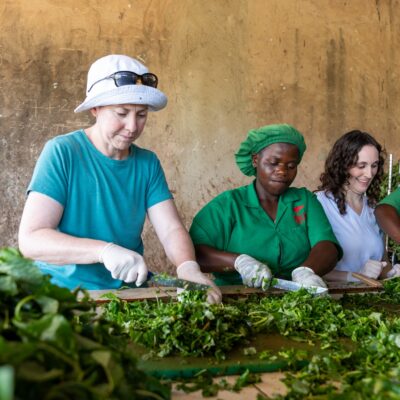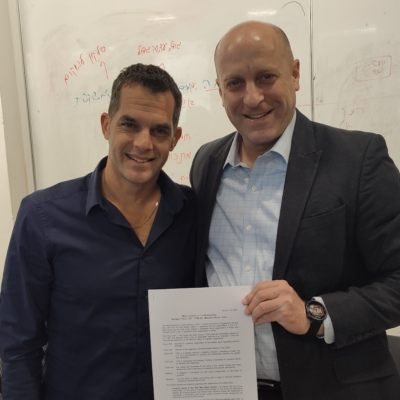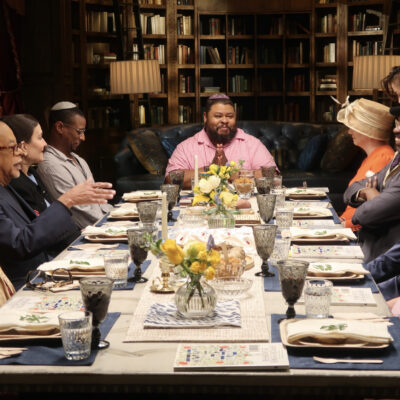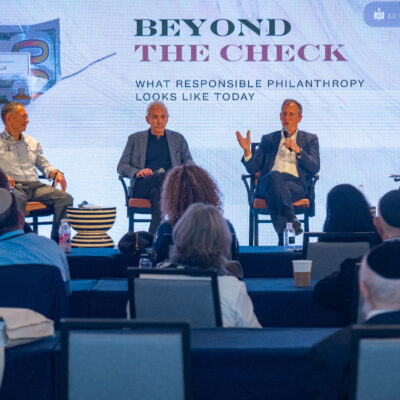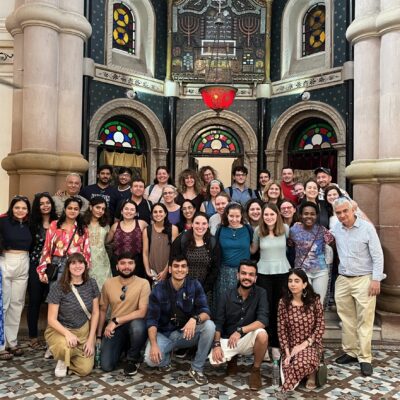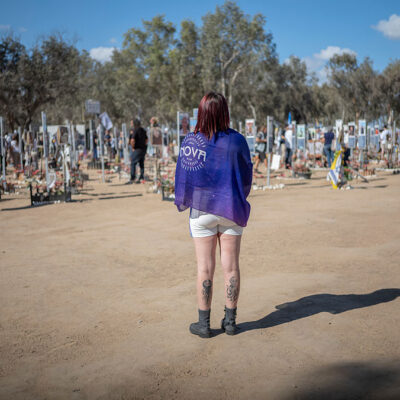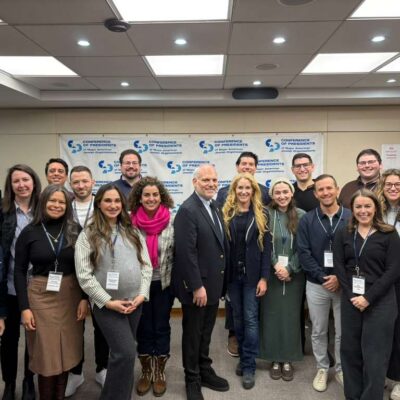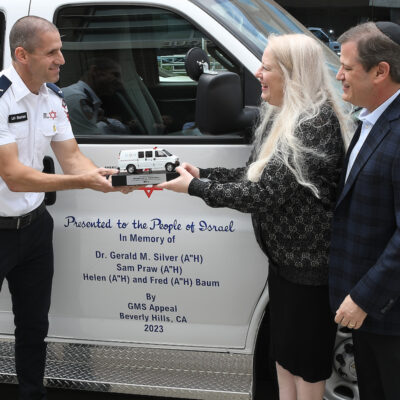Opinion
TODAY’S TOWN SQUARE
How JCCs are meeting the moment in the fight against Jew-hatred
Have you been to your local Jewish community center lately? It probably looks familiar — people working out, swimming, playing pickleball or Mahjong, attending classes and lectures — but beneath the everyday hum, something critical is unfolding.
Today JCCs are stepping up as modern-day town squares to combat the rising tide of Jew-hatred. While they might not be the first organizations that come to mind in this front-line fight, JCCs are uniquely positioned as welcoming hubs of Jewish life and engagement, reaching deep within the Jewish community and far beyond.

An undated photo from a community event for Israel at the Merage JCC in Orange County, Calif. Courtesy/Merage JCC
JCCs have long been more than fitness centers. They are cultural, social and educational gathering places where Jewish identity thrives. One million Jews and half a million people of other faiths and backgrounds across North America pass through JCC doors each week. That’s a staggering reach, offering a rare chance to engage non-Jewish community members on what makes Judaism, the Jewish people and the Jewish State special — to share our resiliency, our values and our humanity.
While families splash in the pool or seniors attend a lecture, JCC leaders are quietly turning access into action, fostering understanding that chips away at prejudice and misperceptions. This fight isn’t new to JCCs. Since their founding in the 19th century, JCCs have been safe havens, building Jewish pride amid hostility. Today, they are active educational conveners — a key element in dismantling antisemitism.
Recent studies from Boundless underscore the urgency of this work. A nationwide survey by Boundless and the research firm BSG reveals that only 14% of Americans accurately define Zionism as “the movement that supports the Jewish people having a state in their ancestral homeland, Israel.” The remaining 86% either don’t know or think it means something else, interpreting it in ways that range from misguided to outright malicious. Importantly, the survey also reveals that even a small amount of education radically transforms perceptions. After being given this simple definition of Zionism, for instance, respondents who identify as Zionist jump from 9% to 38%. If clarifying this definition yields a fourfold return, imagine the impact of a conversation, class or program delivered by trusted voices at a local JCC.
In the same vein, the study also found that even brief education can shift views on antisemitic dog whistles like “From the River to the Sea” or “By Any Means Necessary.” These phrases are often used to deny Israel as the Jewish homeland and to justify Jew-hatred. Initially, more than half of survey respondents — 54% — did not see these slogans as antisemitic. After a simple explanation of why these statements are anti-Zionist, only 38% remained unmoved. These results illustrate the power of education that highlights nuance, prioritizes facts and fosters productive discomfort.
Over the past year, 100 JCC executives and senior leaders from across North America took a deep dive into these studies as part of a four-day applied learning experience with academics and practitioners. Titled “Navigating Israel and the Rise of Antisemitism,” the partnership among JCC Association of North America, Brandeis University and Boundless helped participants understand the history of antisemitism and how the delegitimization of Israel has become a fast-growing expression of Jew-hatred since Oct. 7.
As the Boundless research noted, offering clear definitions of terms, building relationships and providing basic education and awareness are critical if JCC leaders are to guide their communities effectively at this moment of collective fear and uncertainty. Using real-world case studies from the JCC Movement — which includes more than 170 JCCs across U.S. and Canada — to bring the concepts to life and make the content directly applicable to their work at home, participants identified three target audiences they wish to engage further: teens, JCC staff and allies beyond the Jewish community.
The insights from this seminar are already informing how JCCs translate knowledge into action. For example, the Michael-Ann Russell JCC in North Miami Beach launched an online teen curriculum in partnership with OpenDor Media to bolster Jewish pride, knowledge and connection to Israel. At the Rady JCC in Winnipeg, a new interfaith outreach initiative sponsored by the Asper Foundation welcomes community members from various faith traditions to experience Shabbat dinner and engage in dialogue. Kaplen JCC on the Palisades in Tenafly, N.J., continues to offer community-wide trainings and mobilization to confront antisemitism, including conversations with local civic and political leaders and workshops for parents of college students experiencing antisemitism on campus.
Indeed, JCCs across North America are emerging as critical venues for education, advocacy and bridge-building. While ignorance fuels hate, JCCs serve as natural classrooms — places where interfaith dialogues flourish, neighbors discover Jewish history and long-held myths are dispelled. We partner with a broad representation of local organizations to teach about Jewish life, history, culture, our connection to Israel and contemporary expressions of antisemitism. A child at a JCC camp might hear a Holocaust survivor’s story; a non-Jewish guest might join a Passover seder. These moments do more than educate — they humanize Judaism, replacing stereotypes with empathy and connection.
After the atrocities of Oct. 7, JCCs didn’t hesitate to step up and address the spike in antisemitism and Jew-hatred. They provided support and solidarity, responding with compassion and with purpose. Vigils, supply drives and educational programs became avenues for healing and awareness, reinforcing JCCs’ role as trusted conveners and community anchors.
Collaboration amplifies their impact in their local communities and beyond. In Orange County, the Merage JCC helped launch the Jewish Community Action Network (JCAN) to educate, empower and advocate for the Jewish community. JCAN partners with grassroots organizers and established groups like Anti-Defamation League, American Jewish Committee, The Brandeis Center, Israeli-American Council, and the Jewish Federations of North America. This collaboration has deepened ties with elected officials and fortified the local Jewish community. In other regions, JCCs also are leading and supporting initiatives that showcase their credibility as community pillars and conveners.
Some may ask why JCCs — spaces perhaps best known for their summer camps, early childhood programs and fitness classes — are wading into advocacy. But that’s precisely what makes them so effective: Their deep, personal ties to the community make them trusted messengers, able to challenge ignorance with empathy and education. We meet people where they are — around the gym, in the classroom and by the pool — and turn ordinary moments into opportunities for learning and connection.
There is not only an opportunity but an imperative to seize this moment. To do so, however, JCCs must double down by training staff to identify and label antisemitism, and they must craft bold outreach and turn community members into advocates. JCCs can’t erase Jew-hatred alone; but as Jewish town squares, they are perfectly poised to lead.
While the pool buzzes and Mahjong tiles clack, JCCs are proving that community is the strongest weapon we have to fight the forces against our people. The time to act is now — because if not us, then who?
Scott Braswell is the CEO of Merage Jewish Community Center in Orange County, Calif.
Rachel Fish is the special advisor to the Brandeis University President’s Initiative on Antisemitism and the co-founder of Boundless.

 Add EJP on Google
Add EJP on Google